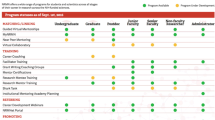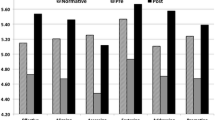Abstract
Objective
The authors developed mentorship programs to train minority junior faculty and advanced graduate students in mental health services research.
Method
The programs target “mentees” in the Southwest United States and offer long-term mentoring, seminars, group supervision seed funding for peer reviewed research proposals peer interaction, and weeklong institutes that feature presentations and mentoring by recognized experts.
Results
Evaluations suggest that these programs have influenced participants’ career development. Most mentees have continued to evolve in their research careers, submitted research grant applications, and obtained postdoctoral fellowships, and/or have advanced in faculty positions. Some mentees have expressed an opinion that without the support network that these programs provided, they would have abandoned their academic careers.
Conclusions
Future training efforts should take into account a series of challenges and tensions that affect mentees’ careers and personal lives, including the emotional legacy of discrimination and historical trauma.
Similar content being viewed by others
References
Kupfer DJ, Hyman SE, Schatzberg AF, et al: Recruiting and retaining future generations of physician scientists in mental health. Arch Gen Psychiatry 2002; 59: 657–660
Institute of Medicine: Research Training in Psychiatry Residency: Strategies for Reform. Washington, DC, National Academies Press, 2003
Yager J, Greden J, Abrams M, et al: The Institute of Medicine’s report on research training in psychiatric residencies: strategies for reform—background, results, and follow up. Acad Psychiatry 2004; 28: 267–274
Pope-Davis DB, Liu WM, Toporek RL, et al: What’s missing from multicultural competency research: review, introspection, and recommendations. Cultur Divers Ethni Minor Psychol 2001; 7: 121–138
National Institute of Mental Health Faculty Scholars Program. Available at http://www.hsrcenter.ucla.edu/training. Accessed March 17, 2005. University of California, Los Angeles, Calif, 2005
American Indian and Alaska Native Programs. Available at http://www.uchsc.edu/sm/psych/dept/research/aianp.htm. Accessed March 16, 2005. University of Colorado Health Science Center, Department of Psychiatry, Denver, Colo, 2005
Clinical Research Training & Career Development http://www.aamc.org/advocacy/research/clinical/training/start.htm Accessed March 16, 2005. American Association of Medical Colleges, Washington, DC, 2005
Statistical tables and announcements http://www.census.gov/statab/ranks/rank33.html; http://www.census.gov/prod/2004pubs/03statab/health.pdf; http://www.census.gov/statab/ranks/rank25.html; http://quickfacts.census.gov/qfd/states/35000.html; http://grants.nih.gov/grants/guide/rfa-flles/RFA-RR-01-005.html; http://wonder.cdc.gov/ Accessed March 17, 2005. U.S. Census Bureau and National Institutes of Health, Washington, DC, 2005
Chené R, García L, Goldstrom M, Pino M, Peña Roach D, Thunderchief W, Waitzkin H: Mental health research in primary care: mandates from a community advisory board. Ann Fam Med. 2005: 3: 70–72; Appendix: http://www.annfammed.org/cgi/content/full/3/1/70/DC1. Accessed March 17, 2005
Duran B, Malcoe LH, Sanders M, et al: Child maltreatment prevalence and mental disorders outcomes among American Indian women in primary care. Child Abuse Neglect 2004; 28: 135–145
Duran B, Sanders M, Skipper B, et al: Prevalence and correlates of mental disorders among American Indian women in primary care. Am J Pub Health 2004; 94: 71–77
Escalona R, Achilles G, Waitzkin H, et al: PTSD and somatization in a women’s health primary care sample. Psychosomatics 2004; 45: 291–296
Walters KL, Simoni JM: Reconceptualizing native women’s health: an “indigenist” stress-coping model. Am J Public Health 2002; 92: 520–524
Walters KL, Simoni JM, Evans-Campbell T: Substance use among American Indians and Alaska Natives: incorporating culture in an “indigenist” stress-coping paradigm. Public Health Rep 2002; 117(suppl. 1): 104–117
Cruz M, Pincus HA: Research on the influence that communication in psychiatric encounters has on treatment. Psych Serv 2002; 53: 1253–1265
Kopelowicz A, Zarate R, González V, et al: Evaluation of expressed emotion in schizophrenia: a comparison of Caucasians and Mexican-Americans. Schizophr Res 2002; 55: 179–186
Clark RL, Mendoza R: The multicultural life styles of urban American Indians living in Los Angeles County. Am Indian Culture Res J, University of California, Los Angeles, April 2002
Jacob M, Wilkes R, Eds: Special issue: Indigenous peoples: Canadian and U. S. perspectives. Am Behav Sci 2004
Díaz-Martínez A, Escobar JI: Assessing and treating depressed Latino patients in primary care. New Jersey Med 2002; 99: 37–39
Interian A, Gara M, Díaz-Martínez AM, Warman MJ, Escobar JI, Manetti-Cusa J. The value of pseudoneurological symptoms for assessing psychopathology in primary care. Psychosom Med 2004; 66: 141–146
Community Based Participatory Research for Health. Edited by Minkler M, Wallerstein N. San Francisco, Calif, Jossey-Bass, 2003
Author information
Authors and Affiliations
Corresponding author
Additional information
To the memory of Dr. Ervin Lewis, whose passion about justice and education for American Indians and other groups sharing a history of discrimination and trauma inspired the efforts that the authors describe here.
Supported in part by grants 1R24 MH58404, 1R25 MH60288, 1R03 MH067012-01, and K01 MH02018-01A1 from the National Institute of Mental Health (NIMH) and by grant 048127 from the Robert Wood Johnson Foundation. We express gratitude to the late Kenneth Lutterman, Ann Hohmann, Enid Light, and Junius Gonzales at NIMH; Lisa Cacari-Stone Billie Jo Kipp Dona Lewis Rebeca Jasso-Aguilar Jean Cordova, John Oetzel, Gloria López, and Julia Taylor at the University of New Mexico; and Roberto Chené, Lorenzo García, Margie Goldstrom, Mandy Pino, Delfi Peña Roach, Wendy Thunderchief, Porfirio Bueno, Antony Stately, Nadine Tafoya, and Melinda García of our Community Advisory Board for their major contributions to these efforts.
Rights and permissions
About this article
Cite this article
Waitzkin, H., Yager, J., Parker, T. et al. Mentoring Partnerships for Minority Faculty and Graduate Students in Mental Health Services Research. Acad Psychiatry 30, 205–217 (2006). https://doi.org/10.1176/appi.ap.30.3.205
Published:
Issue Date:
DOI: https://doi.org/10.1176/appi.ap.30.3.205




